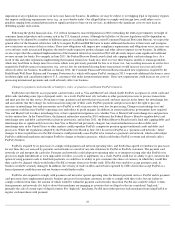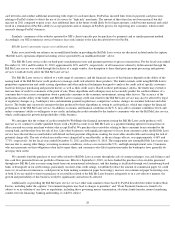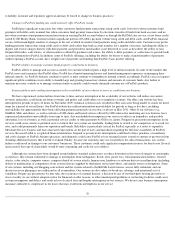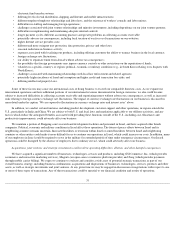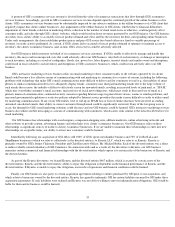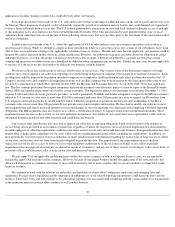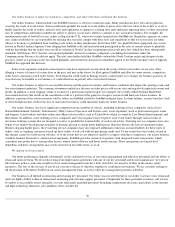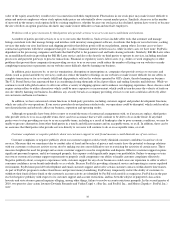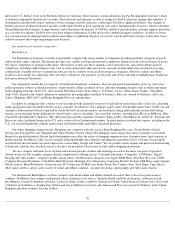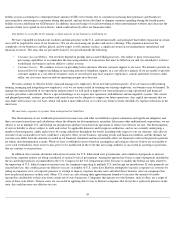eBay 2011 Annual Report Download - page 40
Download and view the complete annual report
Please find page 40 of the 2011 eBay annual report below. You can navigate through the pages in the report by either clicking on the pages listed below, or by using the keyword search tool below to find specific information within the annual report.
application of similar existing or future laws could adversely affect our business.
Several proposals have been made at the U.S. state and local level that would impose additional taxes on the sale of goods and services over
the Internet. These proposals, if adopted, could substantially impair the growth of ecommerce and our brands, and could diminish our opportunity
to derive financial benefit from our activities. The U.S. federal government's moratorium on state and local taxation of Internet access or multiple
or discriminatory taxes on ecommerce has been extended through November 2014. This moratorium does not prohibit federal, state, or local
authorities from collecting taxes on our income or from collecting certain taxes that were in effect prior to the enactment of the moratorium and/or
one of its extensions.
Similar issues exist outside of the U.S., where the application of VAT or other indirect taxes on ecommerce providers such as eBay is
uncertain and evolving. While we attempt to comply in those jurisdictions where it is clear that a tax is due, certain of our subsidiaries have, from
time to time, received claims relating to the applicability of indirect taxes to our fees. Should such taxes become applicable, our business could be
harmed. We collect and remit indirect taxes in certain jurisdictions. However, tax authorities may raise questions about our obligation to collect
and remit such taxes, as well as the proper calculation of such taxes. For example, a Korean tax authority is currently asserting that certain
coupons and incentives available on our sites should not be deducted when computing taxes on our fees. Should any new taxes become applicable
to our fees or if the taxes we pay are found to be deficient, our business could be harmed.
We do not collect taxes on the goods or services sold by users of our services. One or more states or the federal government or foreign
countries may seek to impose a tax collection, reporting or record-keeping obligation on companies that engage in or facilitate ecommerce. Such
an obligation could be imposed by legislation intended to improve tax compliance (and legislation to such effect has been discussed in the U.S.
Congress, several states and a number of foreign jurisdictions) or if an eBay company was ever deemed to be the legal agent of the users of our
services by a jurisdiction in which eBay operates. In July 2008, the Housing and Economic Recovery Act of 2008 (H.R. 3221) was signed into
law. This law contains provisions that require companies that provide payments over electronic means to users to report to the Internal Revenue
Service (IRS) information on payments received by certain customers. The legislation, effective for payments received after December 31, 2010,
requires PayPal and other electronic payments providers, as well as potentially StubHub and similar companies, to report to the IRS on customers
subject to U.S. income tax who receive more than $20,000 in payments and more than 200 payments in a year, to request tax ID numbers from
U.S. taxpayers and track payments by tax ID number, and to withhold a proportion of payments and forward such withholding to the IRS if
customers who receive more than 200 payments do not provide correct and complete information. We have had to modify our software to meet
these requirements and expect increased operational costs and changes to our user experience in connection with complying with these reporting
obligations. The IRS regulations may also require us to collect a certification of non-U.S. taxpayer status from international merchants. These
requirements may decrease seller activity on our sites and harm our business. Any failure by us to meet these new requirements could result in
substantial monetary penalties and other sanctions and could harm our business.
One or more other jurisdictions may also seek to impose tax collection or reporting obligations based on the location of the product or
service being sold or provided in an ecommerce transaction, regardless of where the respective users are located. Imposition of a discriminatory
record keeping or tax collecting requirement could decrease seller activity on our sites and would harm our business. Foreign authorities may also
require eBay to help ensure compliance by our users with local laws regulating professional sellers, including tax requirements. In addition, we
have periodically received requests from tax authorities in many jurisdictions for information regarding the transactions of large classes of sellers
on our sites, and in some cases we have been legally obligated to provide this data. The imposition of any requirements on us to disclose
transaction records for all or a class of sellers to tax or other regulatory authorities or to file tax forms on behalf of any sellers, especially
requirements that are imposed on us but not on alternative means of ecommerce, and any use of those records to investigate, collect taxes from, or
prosecute sellers, could decrease seller activity on our sites and harm our business.
We pay input VAT on applicable taxable purchases within the various countries in which we operate. In most cases, we are entitled to
reclaim this input VAT from the various countries. However, because of our unique business model, the application of the laws and rules that
allow such reclamation is sometimes uncertain. A successful assertion by one or more countries that we are not entitled to reclaim VAT could
harm our business.
We continue to work with the relevant tax authorities and legislators to clarify eBay's obligations under new and emerging laws and
regulations. Passage of new legislation and the imposition of additional tax or tax-related reporting requirements could harm our users and our
business. There have been, and will continue to be, substantial ongoing costs associated with complying with the various indirect tax requirements
in the numerous markets in which eBay conducts or will conduct business.
35




